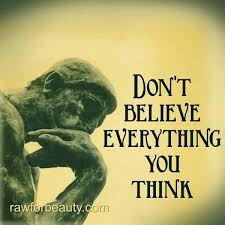Welcome home! Please contact lincoln@icrontic.com if you have any difficulty logging in or using the site. New registrations must be manually approved which may take several days. Can't log in? Try clearing your browser's cookies.
Giving up the "I"
 JaySon
Florida Veteran
JaySon
Florida Veteran
in Philosophy



Comments
Make sure you know exactly where and what the I is so you don't abandon the wrong thing.
The "I" can't be found within nor outside of the mind/body complex. This doesn't mean you don't exist. It only means you don't exist in the way you believe you do. You are a dependent arising.
I like this analogy. Water is made up of two hydrogen atoms and one oxygen atom, when those come together a water molecule is formed. There isn't some preexisting thing called water that the atoms belong to.
The self is the same way, it arises when all the necessary causes and conditions come together, there isn't some thing that exists outside of those causes and conditions that belong to the self. It isn't YOUR body or YOUR mind, you ARE the body and mind.
So what we are giving up isn't the body and mind that we are, we are giving up the false idea that there is a self aside from the body and mind.
Far too much wisdom on this thread.......
I await @Shoshin's contribution with more speech-marks and inverted commas than you can shake a stick at....
In the meantime, it all stands as a good reminder....
No I in Happi?
Wisdom is now resumed ...
The "I" is just a concept, a label merely imputed by the mind, a label that your mind projects onto this combination of aggregates.
In the same way, the mind projects the label "table" onto a slab of wood with four slabs of wood connected to it. The mind projects the label "table" onto its base.
Label. Table. Hey, that rhymes.
“I” like this thread
Very pithy and yet educational.
Wonderful to imagine you could "give up" what you never had in the first place ... a bit of imagining that supports rather than clarifies the very thing you claim to be reducing. In the army, we used to label such activities as a "clusterfuck."
I think we're saying basically the same thing in different ways. My false idea = your mental label.
""I" am just a thought who thinks "I" am thinking ...but "I" am just a thought"

Likewise if you don't give up identification with the 5 aggregates
the I cannot be abandoned and suffering will not end.
You can't give up identification because you don't realise that:
Contemplating the body according to reality contradicts the notions that it is or belongs to the I. Some of it, like movement or respiration, appears subject to direct control, but otherwise happens and stops independent of the I. Other aspects, like the heart, may only be influenced indirectly. Volition associated with the I is just one of many conditions influencing the body. Bodies are born, age and die. In that, as it’s come to be, the I has no say.
Such contemplation reinforces the notions that the body neither is nor belongs to the I. Clinging to it is futile and causes suffering. Persistence plants and nurtures the seeds of disenchantment with the body until dispassion towards it sprouts and clinging to it grows cold. The body as the I is given up.
Contemplating feelings according to reality….
You seem well versed in Theravada. Do you have any thoughts on how volition relates to the sense of self? And how some ideas of our lack of free will relates to the Buddhist notion of volition and anatta?
I'm not expecting a doctoral thesis, just whatever comes to mind.
@person, I’m just versed enough to misrepresent Theravaden perspectives. I'd agree with a "lack of free will" in that I think the concept of free will should be set aside for that of conditioned will. Volition and, I think, the sense of self, goes onto the formations heap. Like the others, they’re conditioned and not self. They’re also the second link in the 12 of dependent origination. They’re conditioned by ignorance and lead to suffering.
I'd agree with a "lack of free will" in that I think the concept of free will should be set aside for that of conditioned will. Volition and, I think, the sense of self, goes onto the formations heap. Like the others, they’re conditioned and not self. They’re also the second link in the 12 of dependent origination. They’re conditioned by ignorance and lead to suffering.
How does that not completely contradict the Buddha’s teachings on intentional action?
When the conditions are right to recognize suffering and seek a solution, the conditions for hearing the Dhamma are present. Hearing or, in the case of the Buddha, rediscovering the Dhamma is the condition for conviction, which is the condition for joy, rapture, tranquility, happiness - a whole lot of conditioning carrots -, which are the conditions for concentration, seeing things as they are, disenchantment, dispassion, release, knowledge and vision of release.
In that there’s no free will or persistent self. There’s just the samsaric loop of conditioned arising and, when the right fork, such as a human birth, appears, there’s the potential for transcendental dependent arising. It implodes the loop. Free in a different sense: free from.